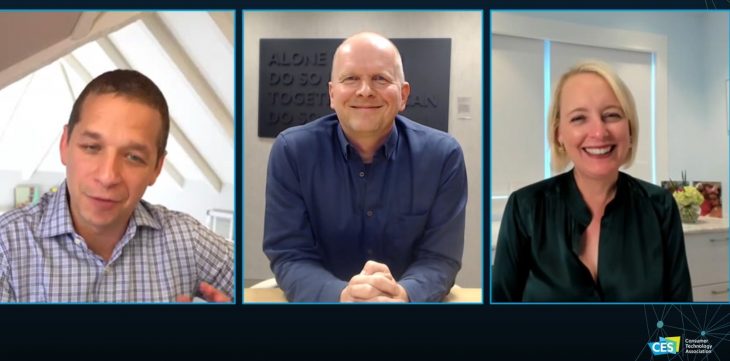
By John Bugailiskis
“YEARS OF DIGITAL ACCELERATION have been compressed into months,” due to the ongoing pandemic, said Mastercard CEO Michael Miebach (centre). In 2019 the portion of total commerce that moved online was 13%, but this rapidly increased to 20% in 2020, which he called a “seismic shift.”
Speaking at a CES panel entitled “Future Reamagined” he was joined on the virtual stage by Accenture CEO Julie Sweet (right). She called the rapid move to e-commerce “compressed disruption,” due to the pandemic forcing companies to transform multiple parts of their organization at once, instead of sequentially in order to carry on business.
Canadian telecom carriers reported navigating such ongoing waves throughout 2020.
“Our latest survey says that about 65% of people who were not working from home before, expect this will continue and 15% of consumers never want to return to a store. All of these build on each other as far as the impact on consumer behaviour,” added Sweet.
Sweet said companies that had artificial intelligence already in place to automate inquiries from customers scored early wins during the pandemic and are in the best position to build on them over the next year.
Mienbach remarked the trend towards increased ecommerce will continue after the pandemic, although at a slightly lower rate as some people will prefer to shop at their local stores. He added the increase in e-commerce “is going to stick wherever it’s a better solution than what was out there in terms of a physical experience.
“If you want to go to a shop and get great advice from the guy you know in your local town, that is a better experience. But for repeatable purchases, where you don’t really have any advantage by being in the shop, why wouldn’t you continue to do it online?
A year before Covid-19 struck, Sweet says Accenture looked at 10 industries across 8,000 companies across the world to measure their digital adoption, leadership and culture. “We found the top 10% were doing twice as well as the bottom 25%, that gap literally widened overnight,” with the pandemic she said.
In order for other companies to catch up it will largely be a “question of leadership” added Sweet. “What is required isn’t simply go and implement some technology, it’s the courage to do compressed disruption of your own business, and it’s the willingness to rethink and the humility to look at other industries and partner to do it fast.”
Moderator Daniel Roth, editor in chief, LinkedIn, asked, given these findings, if there was a danger compressed disruption would further widen the digital divide.
“When you think about the hundreds of millions of small businesses – and yes there are very courageous entrepreneurs – but getting the help that you need to get your business online quickly takes leadership across industries. So different types of leadership are required. If that happens and we have a broader ecosystem in mind, then I think we have a chance that the chasm between the laggards and the leaders doesn’t open up further,” replied Miebach.
“Trusted network solutions around digital identity, safety, security, data principles, are all things that are not really thought about too much across nations at a higher level but are essential for this brave new world to work.” – Michael Miebach, Mastercard
However, he noted when the world was forced to rapidly move online, it did so only to satisfy immediate needs of the crisis. Miebach cautioned once businesses move beyond the crisis mode, they will need to build on that in order to maintain the trust needed to continue online growth.
“There is going to be a lot of young people that are going to be quite happy to provide all sorts of data into this ecosystem and then imagine a world where that trust is actually compromised. Then we could have this all unravel. So trusted network solutions around digital identity, safety, security, data principles, are all things that are not really thought about too much across nations at a higher level but are essential for this brave new world to work,” stressed Miebach.
Roth then asked the panelists what companies need to do over the next decade to address issues around racial inequality and to provide equal opportunities.
Sweet explained how traditional principles needed for a market to really flourish are changing.
“Whether it’s what Michael talked about for example with data privacy, or it’s how to bridge the digital divide and make sure that you have internet access so that everyone could participate in ecommerce and in remote jobs, to providing the foundations of equality, there’s new rules being written,” said Sweet.
She argued what is needed to make a digital global economy work for everyone is now different than in the past.
“There’s more recognition that there is a ton of work to do. Here in the U.S. one-third of black families do not have access to the internet. The implications of that for employment and education are enormous, so I would say a rewriting of what is needed to support a thriving global economy provides an opportunity for companies to work together with governments and not for profits in a different way,” she concluded.
Miebach spoke about how Mastercard is conducting research to determine if it has “the right kind of solutions and products to put into the hands of black American business owners to address the opportunity gap that they have. We have committed $500 million in this area.”



